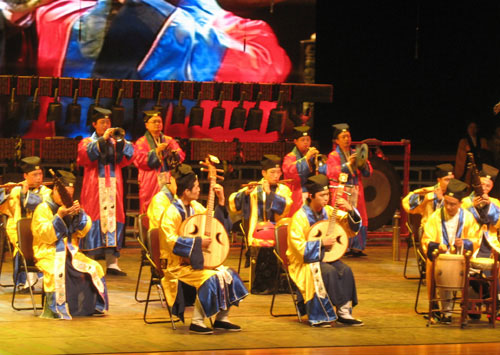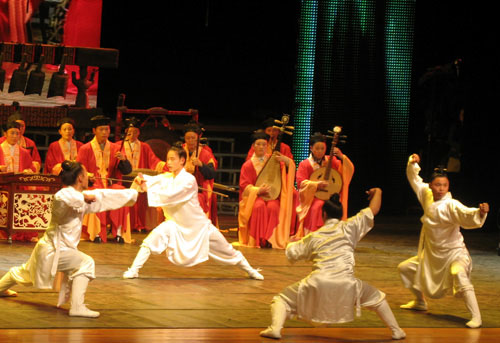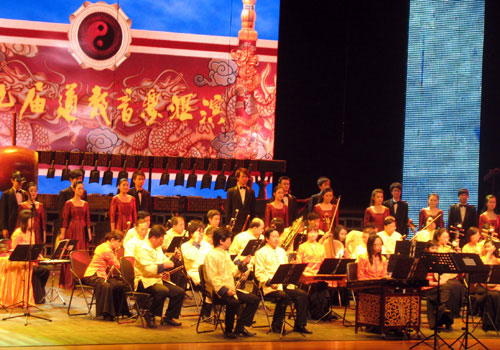Daoist music wows the people, but still a minority taste
I was treated to a rare musical feast last Saturday at the 9th Daoist Music Concert, held in the Hubei Theater in Wuhan.
Ten Daoist bands, from as far away as Hong Kong, Taipei and Singapore, gave fantastic performances that wowed the audience, especially those, who like me, were witnessing a Daoist musical performance for the first time.

The China Daoist Association-sponsored event is held annually, and is billed as "an international event to promote Daoist culture and the cause of Daoism". This year's event had the theme "the sounds of Daoism, Enjoyed by Chinese people everywhere".
But most Chinese people know very little about Daoist music, even if some pieces are widely used in national or daily ceremonies, banquets and celebrations. One piece that is very often heard is the classic "The Moon Reflected in Two Spring" (Listen).
The performances of mostly ritual music occasionally sung by choirs on stage that night were fascinating, making us feel as if we had been transported to a fairyland or to a wild, fresh, unpolluted, sacred and natural place.
Giant screens at the rear of the stage flashed images reflecting the essence of the music: streams, seas, mountains, forests and Daoist immortals. The music flowed though the hall and made us feel we were communicating with nature. The Wudang Mountain Daoist Ritual Musical Band, from the famous Daoist sacred mountain well known for its martial arts, provided some of the most highlights of the evening and drew loud applause when they showed off their kung fu skills.

But one official from a Daoist association told me that real Chinese Daoists are not interested in promoting their music or other aspects of Daoist culture. They are focused on their own spiritual journeys and are more likely to be recluses than performers.
Actually, Wu Chengzhen, the first female abbot in Daoist history, admitted later that the concert cost 80,000 yuan (US$11,718) to stage but the donations they collected were not nearly enough to finance the event and they did not sell tickets to the public. Changchun Daoist Temple had to come up with the money to pay the bills, Wu said. When I asked her why they did not sell tickets to the public, or organize a music concert tour around the world, which would surely promote Daoist music and make money to boot, she simply said "anything is possible from now on".
So although we watched the production in awe that night, access to this wonderful music remains restricted to relatively narrow circles. Anonymous sources told me that the same group of bands play to the same group of people, Daoists and their followers, every year.
Dr. Liu Hong showed me an article he had written explaining the history of modern Daoist music. In the 1950s, music professionals started to collect, compile, research and play Daoist music. In August 1988, Beijing Bai Yun (White Cloud) Temple formed a band and began to play public concerts in Beijing. Afterwards, many Daoist temples started to assemble bands to tour the country, and even travel abroad to Britain, Canada, Belgium and elsewhere, as the influence of Daoism spread around the world. In November, 2001, the first major Daoist Music Concert, which included performances from all the top Daoist bands from around China, was held in Hong Kong.

"The concert is supported by Daoist bands and religious organizations and it has become a regular event held in a different place every year. We are trying to make it more standardized and systematized."
Liu, the director of Hong Kong Daoist Band and the art director of the event this year, also showcased his own musical creations based on his understanding of Daoism. They were fantastic, but it is pity more people were not able to hear them. Liu's band has released several CDs, showing that at least he has some sense of how to promote the music and culture.
I attended the 2nd World Buddhist Forum held in Wuxi and Taipei in April this year and saw the grand musical shows there. I don't have to mention Academy Award-winning musician Tan Dun's "Zen Shaolin, A Music Ritual" and how Taipei's Buddhists have packaged Buddhist ideas and music as pop music. And I know Christian sacred music has always been prominent in western life, even penetrating the rock scene where there is a whole genre of Christian rock. Religious music is popular and can cross over from believers to the general public.
In my opinion, Daoist music is at least as good as any other form of Chinese folk music and could be promoted as a kind of New Age music. If someone is smart enough to do this, please do it now.
 0 Comments
0 Comments






